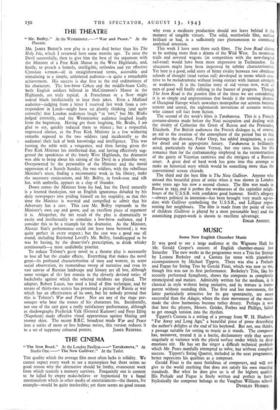THE THEATRE
MR. JAMES &urges new play is a great deal better than his The Holy Isle, which I reviewed here some months ago. To raise the Devil successfully, then to give him the best of the argument with the Minister of a Free Kirk Manse in the West Highlands, and, finally, to preach a homely, intelligible, orthodox and yet effective Christian sermon—all in straightforward terms, accessible and stimulating to a simple, unlettered audience—is quite a remarkable achievement. His success is due first to the real ordinariness of his characters. The low-brow Cohen and the middle-brow Cully, both English soldiers billeted in McCrimmon's Manse in the Highlands, are truly typical. A Frenchman or a Scot- might indeed blush intellectually to hear their jokes. Even a Midland audience—judging from a letter I received last week from a cor- respondent in Leeds—might have sat glumly thinking (and quite correctly) that London audiences laugh " at 'owt," but Mr. Bridie judged correctly, . and the Westminster audience laughed loudly from the beginning. Having got them laughing, Mr. Bridie, I am glad to say, quickly reduced them to silence ; but a respectful, engrossed silence, as the Free Kirk Minister in a few withering remarks exposed to the two soldiers (and incidentally to the audience) their lack of both knowledge and intelligence. This was turning the table with a vengeance, and then having given the Free Kirk Minister his intellectual due, and having effectively sug- gested the spookiness of the lonely West Highlands, the dramatist was able to bring about his raising of the Devil in a plausible way. Overpowered by the personality of the Minister and the moral oppression of a Scotch Sunday, the two soldiers, with the rebellious Minister's niece, finding a necromantic work in his library, make the necessary conjurations, and Mr. Bolfry, in frock-coat and silk hat, with umbrella, appears in a clap of thunder.
Down comes the Minister from his bed, but the Devil naturally is a learned theologian, not an English ignoramus deluded by his daily newspapers into priding himself on his stupidity, so that this time the Minister is worsted and compelled to admit that his Adversary has a case. This case Mr. Bolfry expounds in the Minister's own cap and gown, and an excellent piece of argument it is. Altogether, the net result of the play is dramatically to excite and intellectually to stimulate a low-brow audience, and I consider this to be a triumph for the dramatist. As the Minister, Alastair Sim's performance could not have been bettered ; it was quite perfect in every respect ; but the cast was a good one all round, including Raymond Lovell's Mr. Bolfry, handicapped as he was by having, by the drametises prescription, to drink whisky continuously—a most undiabolic practice.
To reduce Tolstoy's great novel to a theatre play is necessarily to lose all but the cruder effects. Everything that makes the novel great—its profound characterisation of men and women, its acute social observation, its tremendous sweep of narrative and even its vast canvas of Russian landscape and history are all lost, although some vestiges of the last remain in the deverly devised series of backcloths against which the selected incidents are played. The adapter, Robert Lucas, has used a kind of film technique, and by means of thirty-two scenes has presented a picture of Russia at war which has an effectiveness of its own, but let nobody pretend that this is Tolstoy's War and Peace. Nor are any of the stage per- sonages who bear the names of his characters his. Incidentally, not one of the cast gave a really satisfactory performance, although as shadowgraphs Frederick Valk (General Kutusov) and Peter Illing (Napoleon) made effective visual appearances against blazing and stormy skies. The recent B.B.C. broadcast made War and Peace into a series of more or less hideous noises, this version reduces it
to a set of tuppenny coloured posters. JAMES REDFERN.






















 Previous page
Previous page